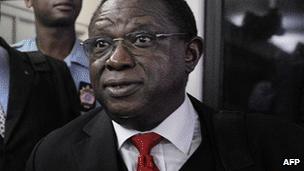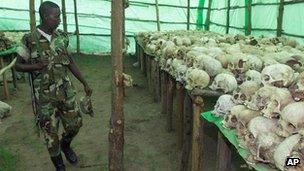Rwanda genocide: Bagosora's life sentence reduced
- Published

Bagosora was convicted three years ago
A man who was seen as a key organiser of the Rwandan genocide has had his sentence reduced from life to 35 years.
Theoneste Bagosora was a senior figure in Rwanda's ministry of defence at the time of the massacres.
In 1994 around 800,000 people - mostly from the Tutsi ethnic group - were killed in just 100 days.
The UN-backed International Criminal Tribunal for Rwanda (ICTR) convicted Bagosora of genocide and crimes against humanity three years ago.
He was arrested 15 years ago in Cameroon and his trial at the Rwanda tribunal in the Tanzanian city of Arusha began in 2002.
Appeal judges in Arusha cleared him of some of the charges he faced, including ordering killings at roadblocks in the capital, Kigali.
But his convictions for genocide and crimes against humanity were upheld.
Co-accused to be freed
The BBC's East Africa correspondent Will Ross says he decision has angered some Rwandans who are are questioning why a man who played such a key role in the genocide would have his sentence reduced.

Around 800,000 Tutsis and moderate Hutus were killed in Rwanda in 1994
They point to the fact that many others who were lowing ranking genocide convicts were given life sentences.
In 1994, Bagosora was chief of staff in the ministry of defence and effectively in charge of the soldiers who took part in the massacres.
The killings began after the plane carrying Rwanda's then-President Juvenal Habyarimana was shot down on 6 April 1994, killing everyone on board.
The appeals court found that he knew the crimes were going to be committed and did nothing to stop them, the AFP news agency reports.
At his trial, Bagosora, who is a Hutu, maintained he was a victim of propaganda by Rwanda's current Tutsi-dominated government.
Bagosora is 70 years old. With time already served, his 35-year sentence will see him imprisoned until he is 89.
One of the men convicted alongside Bagosora, Anatole Nsengiyumva, has had his sentence reduced on appeal to 15 years, and will be released because of time served, says AFP.